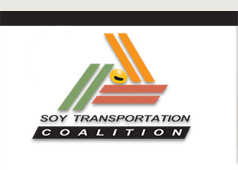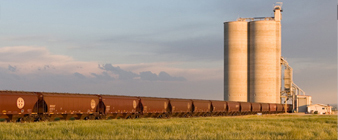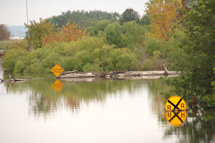 |
 |
|
| eNews • October 2011 | ||
| Promoting a Cost-Effective, Reliable and Competitive Transportation System |
||
 BNSF Pegs Flood-Related Costs at $375 Million
BNSF Pegs Flood-Related Costs at $375 Million
BNSF Railway says by the time it has finished with historic flooding along the Missouri River and elsewhere this year, it expects the tab to be “about $375 million.”
From record snowfall last winter to record runoff floods that hit the BNSF network this summer on the Missouri and Souris rivers, “BNSF has experienced a series of some of the worst impacts from weather in our railroad’s long history,” said Chairman and CEO Matthew Rose.
In a letter to Surface Transportation Board Chairman Daniel Elliott about readiness for the autumn peak season, Rose said some key track sections have reopened and average train speeds are improving. However, “while we have recovered much of the lost velocity and fluidity, we still have a long way to go,” he said.
To help shippers cope, Rose said BNSF has “worked hard to communicate with our customers” about service issues. As for handling the peak, he said given the slowing economy “we do not expect any significant surges in freight activity for the balance of the year.”
The $375 million in costs included disruptions and repairs to two mainline tracks at Minot, N.D., on the route between Seattle and Minneapolis that normally handles 30 trains a train. That area was flooded from late June through early July, Rose said.
Along the Missouri, its St. Joseph subdivision route between Lincoln, Neb., and Kansas City that carries 50 trains a day “was completely severed by the widespread flooding for weeks.”
Rose said at one point BNSF was rerouting about 460 train starts per day or as much as 40 percent of its total traffic, and temporarily relocated nearly 500 train crew workers. It rebuilt tracks up to eight feet higher than they had been along with protective levees, and fixed “many miles of damaged track, bridges and structures.”
That St. Joseph route, a major corridor for coal shipments, reopened Sept. 3, while a track subdivision through Omaha reopened Sept. 9. But in between a route through Napier, Mo., is not slated to reopen until late this month.
Soy Transportation Coalition |
|
